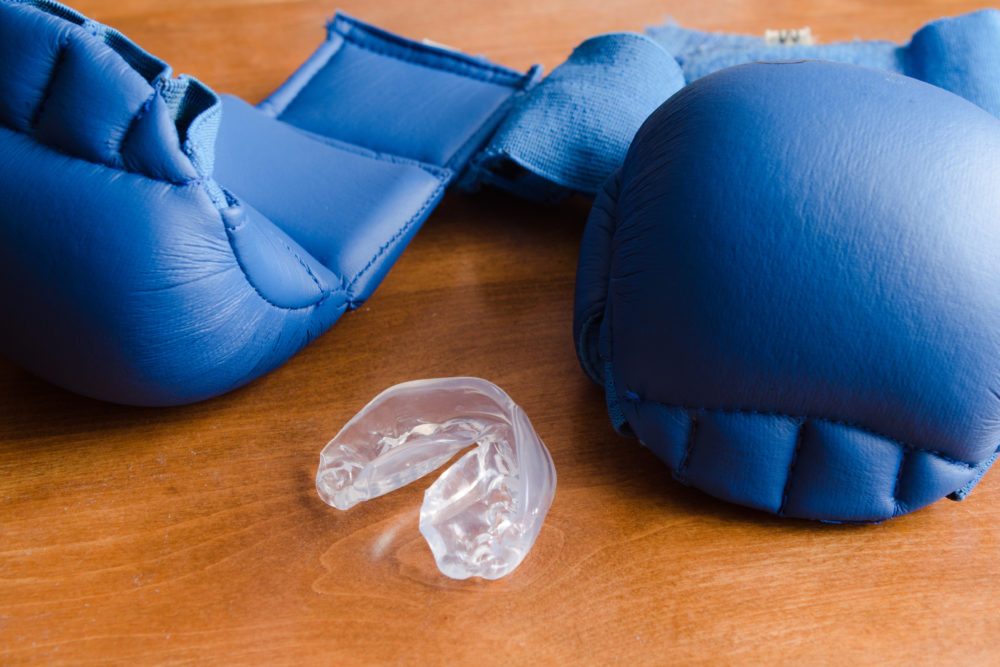
March 1, 2018
Sports Dentistry and Mouth Guards
Sports dentistry deals with the prevention and management of injuries to the mouth, jaw, and face as a result of participation in sports. A properly fitting mouth guard is one of simplest and most important ways that you can protect your teeth, jaw, face, and head from injury while participating in sports.
Prevention of sports dental injuries and concussion
Injury prevention is the most important part of sports dentistry, and the best way to prevent sports-related injuries to the teeth, jaw, or face is to wear properly fitting protective devices: helmets, face masks, and/or mouth guards.
Dental injuries are the most common type of sports injury to the face, and an athlete is sixty times more likely to sustain damage to teeth when not wearing a protective mouthguard. However, a properly-fitting mouth guard does a lot more than just protect an athlete’s teeth. In the event of a blow to the jaw, a good mouth guard also reduces the chances of sustaining a face, neck, or head injury like a concussion or jaw fracture. It will protect the soft tissue of your mouth, like the lips, tongue, cheek, and gums, and lessen the chances of breaking your front teeth by about 90%.
When to wear a mouth guard
More than five million teeth are knocked out each year in North America, many during sporting events. A proper mouth guard should be part of every athlete’s gear, no matter the sport or the athlete’s age. If you are participating in a sport where there is a chance of athlete-to-athlete contact or athlete-to-equipment contact, you should wear a mouth guard.
Patients with orthodontic braces are still able to wear mouth guards — in fact a mouth guard will help prevent your wires and bands from breaking during a game and will also prevent your lips and gums from embedding in the braces should you experience some kind of blow to the face. Do not wear removable appliances like retainers when playing sports.
Custom mouth guards vs ready-made or boil-and-bite mouth guards
There are two categories of mouth guards. Custom-made guards are designed by a dentist, based on a cast of your teeth, while ready-made mouth guards are purchased at a sporting goods store. There are many reasons to choose a custom-made mouth guard, for both safety and comfort.
Ready-made and boil-and-bite mouth guards
Ready made mouth guards are a stock shape and can be purchased at a sporting goods store. They are inexpensive, but are not at all adapted to an athlete’s unique bite. They impair speech and breathing and are uncomfortable to wear and keep in place, as the athlete must bite down on the guard to hold it in place. They also do not provide adequate protection, due to the improper fit.
Boil-and-bite mouth guards are also purchased pre-made at a sporting goods store. The athlete boils the ready-made guard, then bites down on the softened guard in order to leave an imprint of his or her teeth and somewhat ‘customize’ the ready-made guard. Though slightly better-formed than stock guards, these boil-and-bite mouth guards are bulky and still are not properly adapted to an athlete’s bite, making them marginally comfortable at best, causing similar problems with speech, breathing, and staying in place, and not providing adequate protection from injury.
Custom-made mouth guards
Custom mouth guards are what professional athletes wear, and are designed and created based on a custom model of your own teeth, to perfectly fit your unique bite. A polyvinyl mold is vacuum-formed or pressure-formed overtop of a stone model of your teeth, and will provide significantly better protection, comfort, and fit, and while not impair your speech and breathing. Our on-site lab can produce mouth guards of varying thicknesses, styles, and colours, and custom mouth guards will work comfortably with orthodontic braces or dental bridges.